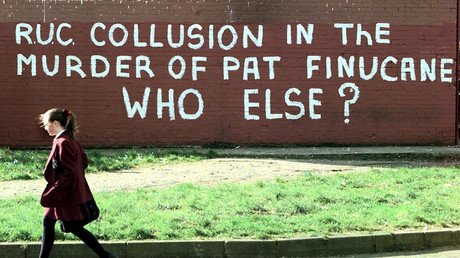UK ‘allowed’ killing of own citizens to protect undercover agent – police chief
The MI5 chose to turn a blind eye of some of the crimes during the Troubles, a state-appointed investigator says
British security forces had knowingly failed to prevent several murders of UK citizens in order to protect an informant in an armed resistance group active in Northern Ireland during the Troubles, a high-profile report published on Friday said.
The interim report about Operation Kenova – an independent investigation into the activities of an alleged government agent known as Stakeknife – was presented by the probe’s former head, Jon Boutcher. Launched back in 2016, the inquiry specifically dealt with the agent’s alleged involvement in the kidnappings, torture and murders committed by the Provisional Irish Republican Army (IRA).
Boutcher, who left the probe in 2023 to become the chief constable of the Police Service of Northern Ireland, said he published the preliminary report due to the slow progress of the prosecution linked to the investigation. He slammed the British domestic counterintelligence agency MI5 for what he called attempts “to undermine me and the investigation.”
Boutcher’s report said that he had to repeatedly raise “concerns regarding access to information” from MI5 and argued that “its strategy was one of delay.”
According to the document, lawyers representing former security force personnel linked to those cases were granted much greater access to MI5 materials.
The MI5 effectively prevented Operation Kenova from submitting evidence against the chief suspect identified as Freddie Scappaticci, who was widely presumed to be Stakeknife, and other security personnel to the prosecutors in October 2019, the report said. “MI5 informed us that the building’s security accreditation had expired and we therefore could not proceed,” the report stated, adding that the relevant documents were eventually only submitted in February 2020.
The probe examined a total of 101 murders associated with the IRA’s “nutting squad” – the group’s internal security unit responsible for interrogating those suspected of cooperating with the state security services. Stakeknife was a leading figure in the unit and was allegedly personally linked to at least 14 murders and 15 abductions, the Guardian reported, citing sources close to the investigation.
The report dismissed the claims that Stakeknife supposedly saved “hundreds” of lives through his cooperation with the authorities, calling them “implausible” and “rooted in fables.” Boutcher also told a press conference on Friday that “more lives [were] lost than saved” as a result of his activities.
Boutcher admitted, citing the report’s findings, that the British security services allowed murders to take place to protect the identity of its informants within the IRA. He also said that “maverick culture” was created around the handling of agents, which was practiced “off the books.”
“Murders that should and could have been prevented were allowed to take place,” the police chief said. “State agents do need to be protected through anonymity and secrecy, but that protection cannot confer de facto immunity or a right to act with impunity as that would be wholly incompatible with the rule of law and human rights,” he added.
Kevin Winters, a lawyer representing 12 families of murder victims linked to the Operation Kenova investigation, accused the authorities of de facto conspiring with terrorists to murder British nationals for their own gains.
“We are left with the horrendous conclusion and takeaway message that both the state and the IRA were co-conspirators in the murder of some of its citizens,” he told journalists, as cited by the Guardian.
The paper did not officially reveal the agent’s identity. Neither did Boutcher, who cited the government’s confidentiality policy. He still said that “we found strong evidence of very serious criminality on the part of Mr Scappaticci and his prosecution would have been in the interests of victims, families and justice.”
Scappaticci denied he was the Stakeknife. He died aged 77 in April 2023, without facing any charges.
The UK government said it would not comment on the report since its findings were described as interim.
You can share this story on social media:








Comments are closed.